Hopefully a lot of satelites can be made in the East, and a lenient peace can be made in the West. The borders easily look bad in France if Germany gets greedy.
The Greatest Germany: The Formation of the Pan-Germanic Union, 1836-1936
- Thread starter The B
- Start date
-
We have updated our Community Code of Conduct. Please read through the new rules for the forum that are an integral part of Paradox Interactive’s User Agreement.
You are using an out of date browser. It may not display this or other websites correctly.
You should upgrade or use an alternative browser.
You should upgrade or use an alternative browser.
I can't please everyone here but I'll do my best.
Remember: Versailles shocked the world. Maybe this'll shock you too (to a reasonable degree).
Remember: Versailles shocked the world. Maybe this'll shock you too (to a reasonable degree).
Wow two updates since I last checked. Great update. Glad to see a victory in the great war.
I can't please everyone here but I'll do my best.
Remember: Versailles shocked the world. Maybe this'll shock you too (to a reasonable degree).
So when will be seeing those results?
XXXIV - Vae Victis
January - November 1904
“The time for petty politics is over: the next century will bring the struggle for the dominion of the world.” - Friedrich Nietzsche, Beyond Good and Evil
It is hard to put into words the effect the Great War had on Europe, and indeed the world. Lives were destroyed, families were ripped apart and the end brought social upheaval in both the victors and the defeated.
The "European Royal Family" (many monarchs in Europe were related) was in turmoil. Many dynasties looked like they could collapse at any time and some people feared chaos not seen since the liberal revolutions around 1848. For the King who just wanted peace, Friedrich, his reputation as someone who could direct the nation forwards into harmonious order was (in his eyes) tarnished. Nevertheless, his relationship with his first cousin once removed, Tsar Nicholas, remained amicable. The two viewed the war as a product of factors out of their control, and in a moment of pity Friedrich made sure that his friend would be allowed asylum in Montenegro (Germania and Britain were far too dangerous).
The scars that the world bore could be seen in the dead.
In total, approximately ten million people had died during the conflict. Nine million of these had been in Europe - of which, five million belonged to Germania and her allies, and four million from the Entente. Germania herself had lost 3.5 million men. Even for the communities who had not directly been affected by war, virtually none were left unscathed by the loss of sons, husbands or friends.
It was time to make the Entente pay.
There were three main powers who would decide the future of the defeated countries: Germania (represented by Bernhard von Bülow), Britain and her Empire (represented by Arthur Balfour) and Hungary (represented by István Tisza).

The Big Three (left to right): Tisza, Balfour and Bülow.
Of course, all came with different goals for their respective countries. Tisza was relatively unconcerned about France and, having no borders with Russia, simply wanted reparations and security, as well as a limitation of German expansion. Balfour, too, wanted to make sure that German expansionism did not get out of hand but his amicable relations with Germania meant that his focus would turn to colonies. Finally, Bülow came with no set goals but to get whatever he could and to "make Russia pay."
Bülow's approach was the result of a conflict both in the Reichstag and out, on not just what to do with the Entente, but how Germania should approach the following years. The country was losing out to the economies of Britain and America. For the Junkers, this meant expansion was needed, but attached to this were dark designs on the continent that many ordinary Germans did not know about, or want to know about. Opposed to this were the left-leaning members of the Reichstag, who simply wanted to do the least punishment possible, in fear of revanchism.
The place of negotiations was eventually decided to be Königsberg Castle, a compromise between Bülow's wishes for the conference to be held in Moscow (the Russian winter made this impossible) and practicality. On the 1st of January, the Königsberg Peace Conference started.

Königsberg Castle.
Each nation was to be tacked individually. With civil unrest brewing across the nation, Russia seemed the first and foremost issue to tackle.
Germania started in a lucky stance: Tisza was a germanophile, Balfour was willing to "let things slip" in the East and Germania had, in the eyes of many, contributed a large part towards winning the war - a morbid and rather morally questionable advantage was that their death count was the highest.
A small army of negotiators took four months to decide Russia's fate. Newspapers waited in anticipation every day for news of progress, as in the evening the "Big Three" would emerge from the castle. By the 4th of April, appearing noticeably more tired, the announcement of the first peace treaty was made. And it was harsh. Covering over four hundred articles, the treaty was lengthy and covered every part of Russia. In summary:
The Treaty was signed by delegates from Russia days later, becoming known as the Treaty of Königsberg. It signalled the beginning of total German domination in Eastern Europe, as well as the end of the Great Game in Asia. Noticeably absent was the topic of democracy and government. Keeping a Tsar in control was seen as not the best option, but the easiest, and one of the first failures of the negotiations was the decision that Russia would "work something out."
France was next. Like with Russia, there were no representatives from France at the conference. With Tisza quiet, this was largely something between Germania and Britain. The Treaty of Versailles took two months.
For the remaining powers, their respective punishments would be more lenient. Spain was forced to hand over Cuba to Britain and Puerto Rico to Germania. Brazil withdrew the current borders with Argentina and Peru. All would pay reparations.
The final country was The Ottomans, or Turkey depending on who was asked. Turkey was in a state of war, both internally and against Serbia. Hungary and Germania successfully managed to send troops in to end the conflict, and brought the issue to the conference.
The Treaty of Sèvres was a brutal treaty. Arguably, it was more about removing Turkey from the Greco-Turkish territories in Europe than dismantling the Empire, as many territories in Asia remained. Nevertheless, Istanbul - Constantinople - was offered to Greece if they would hold democratic elections. This was an incredibly bold move, to say the least - Greece was a communist state.
The "dark shadow" of the conference was China. China had contributed a lot to the war effort in the final months, and as a result was able to quietly annex the area around Vladivostok and western Mongolia.
These treaties shattered the established order in Europe. It was one of the greatest geopolitical amendments in history and changed not just the political scene, but the social and cultural ones too. The effects would be felt throughout the 20th century.
The New Order
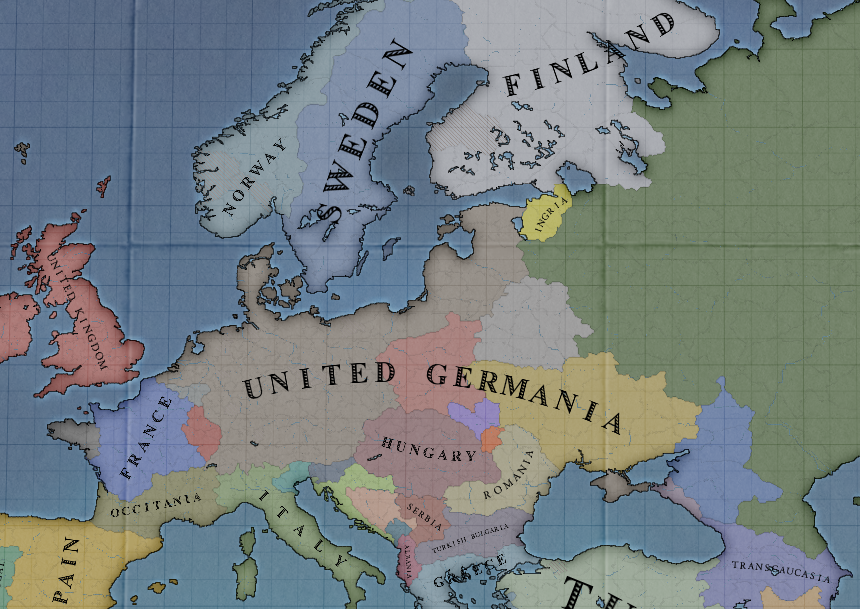
Europe
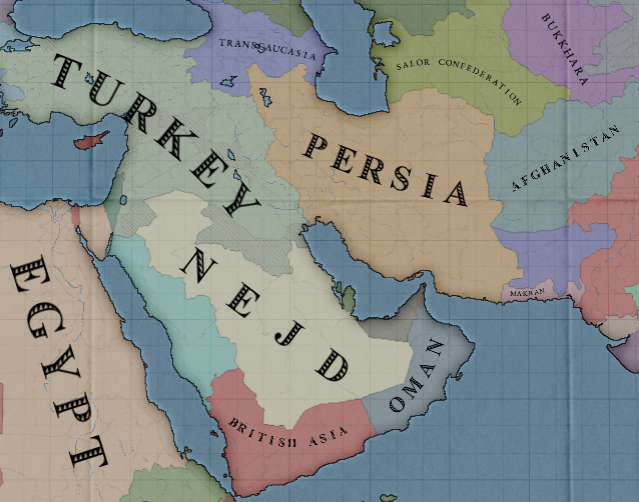
The Middle East
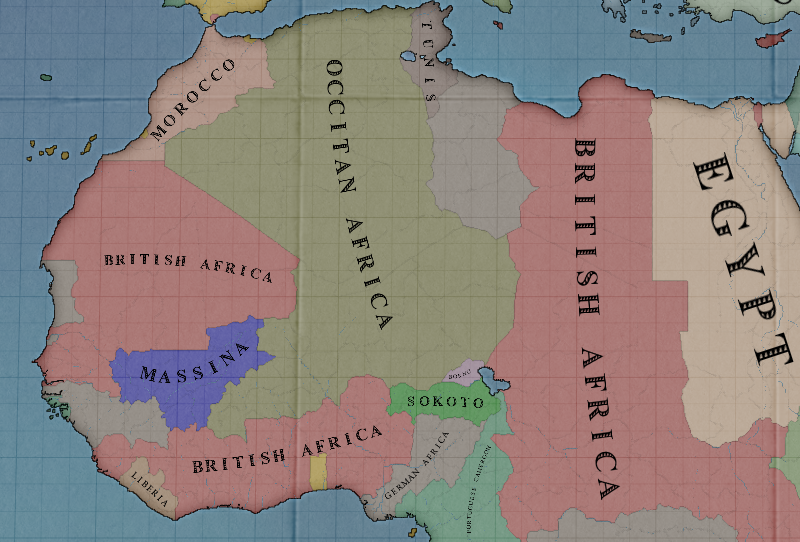
North Africa
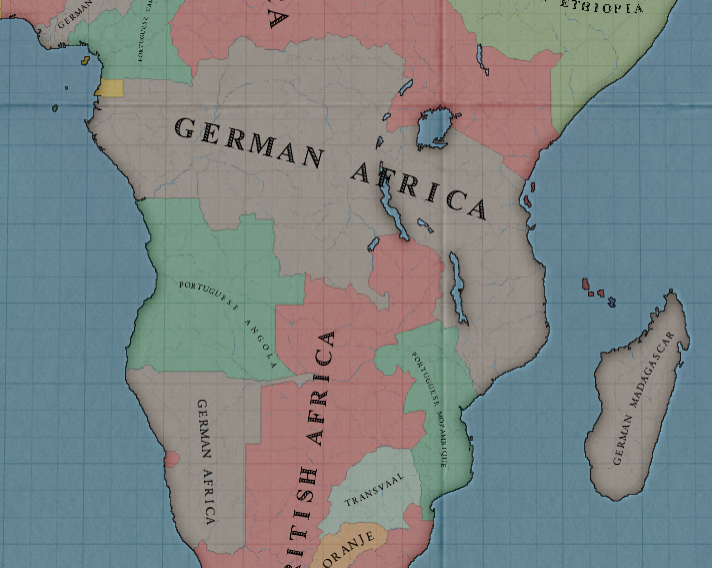
Southern Africa
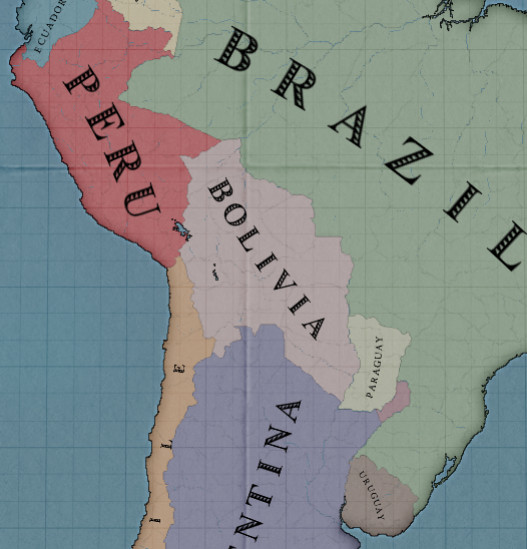
South America

Russian-Chinese border
Only time would tell how these new arrangements would be received and for how long they would remain.
January - November 1904
“The time for petty politics is over: the next century will bring the struggle for the dominion of the world.” - Friedrich Nietzsche, Beyond Good and Evil
It is hard to put into words the effect the Great War had on Europe, and indeed the world. Lives were destroyed, families were ripped apart and the end brought social upheaval in both the victors and the defeated.
The "European Royal Family" (many monarchs in Europe were related) was in turmoil. Many dynasties looked like they could collapse at any time and some people feared chaos not seen since the liberal revolutions around 1848. For the King who just wanted peace, Friedrich, his reputation as someone who could direct the nation forwards into harmonious order was (in his eyes) tarnished. Nevertheless, his relationship with his first cousin once removed, Tsar Nicholas, remained amicable. The two viewed the war as a product of factors out of their control, and in a moment of pity Friedrich made sure that his friend would be allowed asylum in Montenegro (Germania and Britain were far too dangerous).
The scars that the world bore could be seen in the dead.
In total, approximately ten million people had died during the conflict. Nine million of these had been in Europe - of which, five million belonged to Germania and her allies, and four million from the Entente. Germania herself had lost 3.5 million men. Even for the communities who had not directly been affected by war, virtually none were left unscathed by the loss of sons, husbands or friends.
It was time to make the Entente pay.
There were three main powers who would decide the future of the defeated countries: Germania (represented by Bernhard von Bülow), Britain and her Empire (represented by Arthur Balfour) and Hungary (represented by István Tisza).

The Big Three (left to right): Tisza, Balfour and Bülow.
Of course, all came with different goals for their respective countries. Tisza was relatively unconcerned about France and, having no borders with Russia, simply wanted reparations and security, as well as a limitation of German expansion. Balfour, too, wanted to make sure that German expansionism did not get out of hand but his amicable relations with Germania meant that his focus would turn to colonies. Finally, Bülow came with no set goals but to get whatever he could and to "make Russia pay."
Bülow's approach was the result of a conflict both in the Reichstag and out, on not just what to do with the Entente, but how Germania should approach the following years. The country was losing out to the economies of Britain and America. For the Junkers, this meant expansion was needed, but attached to this were dark designs on the continent that many ordinary Germans did not know about, or want to know about. Opposed to this were the left-leaning members of the Reichstag, who simply wanted to do the least punishment possible, in fear of revanchism.
The place of negotiations was eventually decided to be Königsberg Castle, a compromise between Bülow's wishes for the conference to be held in Moscow (the Russian winter made this impossible) and practicality. On the 1st of January, the Königsberg Peace Conference started.

Königsberg Castle.
Each nation was to be tacked individually. With civil unrest brewing across the nation, Russia seemed the first and foremost issue to tackle.
Germania started in a lucky stance: Tisza was a germanophile, Balfour was willing to "let things slip" in the East and Germania had, in the eyes of many, contributed a large part towards winning the war - a morbid and rather morally questionable advantage was that their death count was the highest.
A small army of negotiators took four months to decide Russia's fate. Newspapers waited in anticipation every day for news of progress, as in the evening the "Big Three" would emerge from the castle. By the 4th of April, appearing noticeably more tired, the announcement of the first peace treaty was made. And it was harsh. Covering over four hundred articles, the treaty was lengthy and covered every part of Russia. In summary:
- Russia shall dismantle the majority of her armed forces and is forbidden from raising a larger army.
- Ingria, Belarus, The Cossack Hetmanate and Ukraine will be made independent nations under the protection of Germania.
- Kamchatka will be made an independent nation under the protection of the United Kingdom.
- The peoples of the Caucasus will be subject to a plebiscite on whether to stay part of Russia or join in a Confederation.
- The Salor Confederation and Circassia will be released.
- In ten years a plebiscite will held in Circassia on their future independence.
- The original borders with Afghanistan will be restored.
- The border with Moldova will be revised on ethnic lines.
- Southern Sakhalin and associated islands in the Sea of Okhotsk will be handed over to Japan. After twenty years a plebiscite will be held on these islands on whether to stay with Japan or rejoin Russia.
- Finland will receive the Kola peninsula and Russian Karelia.
- Crimea will be annexed by Germania.
- The European border of Russia will be demilitarised.
- Russia's African possessions will be transferred to Britain.
- Russia will pay reparations, to be decided by a committee.
The Treaty was signed by delegates from Russia days later, becoming known as the Treaty of Königsberg. It signalled the beginning of total German domination in Eastern Europe, as well as the end of the Great Game in Asia. Noticeably absent was the topic of democracy and government. Keeping a Tsar in control was seen as not the best option, but the easiest, and one of the first failures of the negotiations was the decision that Russia would "work something out."
France was next. Like with Russia, there were no representatives from France at the conference. With Tisza quiet, this was largely something between Germania and Britain. The Treaty of Versailles took two months.
- Occitania will be released as an independent democratic nation.
- Brittany will be released under the protection of Britain.
- Corsica will be transferred to Italy under external terms.
- French colonies will be divided between Britain, Occitania and Germania [notably, Germania would receive the French Congo].
- Saint Pierre and Miquelon will be ceded to Canada.
- The border with Germania will be demilitarised.
- A democratic government will be established in France.
- France accepts full guilt for the war.
For the remaining powers, their respective punishments would be more lenient. Spain was forced to hand over Cuba to Britain and Puerto Rico to Germania. Brazil withdrew the current borders with Argentina and Peru. All would pay reparations.
The final country was The Ottomans, or Turkey depending on who was asked. Turkey was in a state of war, both internally and against Serbia. Hungary and Germania successfully managed to send troops in to end the conflict, and brought the issue to the conference.
- Turkey will recognise the new border with Serbia.
- The nations of Albania, Palestine and Nejd will be made independent.
- The border with Bulgaria will be shifted south.
- The border with Greece will be shifted east.
- Crete will be annexed to Germania.
- Aden will be annexed to Britain.
- Montenegro will acquire new territory depending on ethnic lines.
- The Turkish territory in Libya will be divided between Germania and Britain.
- Constantinople will be made an international city.
The Treaty of Sèvres was a brutal treaty. Arguably, it was more about removing Turkey from the Greco-Turkish territories in Europe than dismantling the Empire, as many territories in Asia remained. Nevertheless, Istanbul - Constantinople - was offered to Greece if they would hold democratic elections. This was an incredibly bold move, to say the least - Greece was a communist state.
The "dark shadow" of the conference was China. China had contributed a lot to the war effort in the final months, and as a result was able to quietly annex the area around Vladivostok and western Mongolia.
These treaties shattered the established order in Europe. It was one of the greatest geopolitical amendments in history and changed not just the political scene, but the social and cultural ones too. The effects would be felt throughout the 20th century.
The New Order

Europe

The Middle East

North Africa

Southern Africa

South America

Russian-Chinese border
Only time would tell how these new arrangements would be received and for how long they would remain.
Last edited:
- 1
Given the German domination in Europe, countries with a significant German population and under your influence, such as Wallonia and Ingra, should have German cultures added as accepted cultures if they aren't already - after all, Germania wouldn't take very kindly to its citizens being discriminated against.
a very harsh peace! but, why did Germania annex Crete? better to release them or be given to the Greeks, even if they are communists
What an extremely harsh punishment for Russia, especially since they now have no warm water ports...
Oof, a harsh, harsh peace, but of course it had to be this way to prevent another Great War. Forward, in the German Century!
Would it be possible to make the return of Constantinople to Greece conditional upon a shift in their political policies? Given its strategic and cultural importance, any regime that rejects its return is likely to face an uproar.
Oof, a harsh, harsh peace, but of course it had to be this way to prevent another Great War. Forward, in the German Century!
I can't think of a way that wouldn't work
Damn. That's harsh. I love it!
How significant is the loss of SPB from the Russians?

How significant is the loss of SPB from the Russians?
Hegel was right!Oof, a harsh, harsh peace, but of course it had to be this way to prevent another Great War. Forward, in the German Century!
Good God, that's a harsh peace. I guess Great War capitulation gives you a carte blanche?
A good idea, will do.Given the German domination in Europe, countries with a significant German population and under your influence, such as Wallonia and Ingra, should have German cultures added as accepted cultures if they aren't already - after all, Germania wouldn't take very kindly to its citizens being discriminated against.
Crete will be returned upon democratic elections being held in Greece.a very harsh peace! but, why did Germania annex Crete? better to release them or be given to the Greeks, even if they are communists
This will certainly not be forgotten in Russia.Wow... man... Peter just turned over in his grave...
The seizure of Vladivostok is something that was out of my control. I will endeavour to get it back.What an extremely harsh punishment for Russia, especially since they now have no warm water ports...
Huzzah!Oof, a harsh, harsh peace, but of course it had to be this way to prevent another Great War. Forward, in the German Century!
This is a very logical point. I will add that detail.Would it be possible to make the return of Constantinople to Greece conditional upon a shift in their political policies? Given its strategic and cultural importance, any regime that rejects its return is likely to face an uproar.
What could go wrong?*cough*frenchhitler*cough*
St Petersburg won't have a great effect on Russia for the moment, as they are in anarchy. In the future it will, however, be very damaging.Damn. That's harsh. I love it!
How significant is the loss of SPB from the Russians?
Hegel was right!
I edited the game with the console. In some ways this was less harsh than what the AI proposed- I gave Russia back her 'stans, and tried to limit the Chinese expansion.Good God, that's a harsh peace. I guess Great War capitulation gives you a carte blanche?
can you post a save game, after the peace was declared? I would like to see if I can Bring Russia to its glory! not to mention, Russia fasist Flag is awesome! 
Why does it say 'Turkish Bulgaria'? Is it still an Ottoman Puppet? And the China situation is rather odd... is Mongolia an independent country? What's the little bit of color I can't determine east of the Crimea? And what is the Fengtian Clique doing in a place without any Chinese people?

